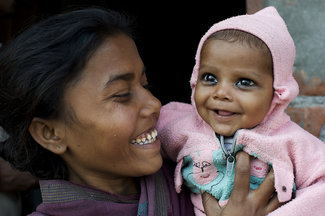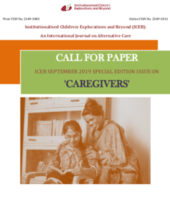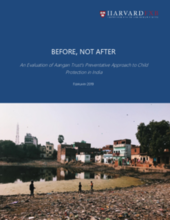

Displaying 331 - 340 of 753
This book largely focuses on unaccompanied minors who arrived in a European country in 2015, with special attention paid to the top-three nationalities of unaccompanied minors, namely Syrian, Afghan and Eritrean minors.
This opinion piece by Vageshwari Deswal in the Times of India makes the case for promoting and strengthening foster care in India.
ICEB is an international, multi-disciplinary, peer-reviewed academic journal on Alternative Care for out-of-home-care (OHC) children and young persons, focused on the South Asia region. The journal invites you to participate in its call for paper for their September 2019 Special Edition issue on the topic 'Caregivers'.
The purpose of the consultancy is to provide technical assistance to support the State and Local levels in in planning, budgeting and monitoring of child protection interventions with focus to address child marriage, child labour, violence discipl
This study aimed to determine the relationship of intergenerational abuse with child emotional maltreatment (CEM) among 11–17 years old children residing in peri-urban and urban communities of Karachi, Pakistan.
Child rights activists in the Indian state of Tamil Nadu have lauded the Australian government's recent inclusion of orphanage trafficking in their Modern Slavery Act and the country's efforts to cut off support to overseas orphanages, according to this article from the Times of India.
To ensure protection of children from institutional abuse, there is an urgent need to review the existing laws in terms of their efficacy to protect children and feasibility in implementation. The present study suggests possible solutions, by trying to understand standardized and effective models of care systems and mechanisms.
"A total number of 1,265 children have been reported to have died in specialised adoption agencies (SAAs) across states between April 2014 to January 31, 2019," according to this article from the Times of India.
This study documents and evaluates the harm prevention work carried out by the children’s rights nonprofit Aangan Trust since late 2015 in Konia, a peri-urban slum area in Varanasi, a large city in the Indian state of Uttar Pradesh.
The licenses of 16 Child Care Institutions (CCI) in Jharkhand, India have been revoked "following a report submitted by the State Commission for Protection of Child Rights (SCPCR) with a recommendation to take action against 31 such shelter homes in the State," according to this article from the New Indian Express.


